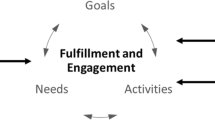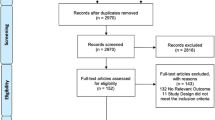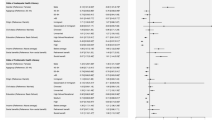Abstract
Guided by the models of health assessment and social determinants of health, we examined predictors of self-rated physical, mental, oral, and cognitive health of older Korean immigrants. Data came from the Study of Older Korean Americans (SOKA; N = 2,061, Mean age = 73.2). Multivariate regression models of self-ratings of health were tested with health indicators (both domain-specific and other health indicators including chronic disease, functional disability, mental distress, problems with teeth or gums, and cognitive function) and sociocultural factors (acculturation, social network, and ethnic community social cohesion). For self-rated physical, mental, and oral health, indicators specific to the targeted domain played a primary role, with those of other health domains playing a secondary role. Acculturation and social network were significant predictors of all four measures. Findings highlight the importance of holistic health assessment that considers a wide range of health domains as well as sociocultural contexts.
Similar content being viewed by others
References
Colby SL, Ortman JM. Projections of the Size and Composition of the US population: 2014 to 2060. Washington, DC: U.S. Census Bureau; 2015.
Jang Y, Yoon H, Park NS, Chiriboga DA. Health vulnerability of immigrants with limited English proficiency: a study of older Korean Americans. J Am Geriatr Soc. 2016;64(7):1498–502.
Lum TY, Vanderaa JP. Health disparities among immigrant and non-immigrant elders: the association of acculturation and education. J Immigr Minor Health. 2010;12(5):743–53.
U.S. Census Bureau: Selected Characteristics of the Native and Foreign-born Populations: 2012-2016 American Community Survey 5-year Estimates. Washington, DC: U.S. Census Bureau; 2016
Đoàn LN, Takata Y, Sakuma KL, Irvin VL. Trends in clinical research including Asian American, Native Hawaiian, and Pacific Islander participants funded by the US National Institutes of Health, 1992 to 2018. JAMA Netw Open. 2019;2(7):e197432.
Ghosh C. A national health agenda for Asian Americans and Pacific Islanders. JAMA. 2010;304(12):1381–2.
Islam NS, Khan S, Kwon S, Jang D, Ro M, Trinh-Shevrin C. Methodological issues in the collection, analysis, and reporting of granular data in Asian American populations: historical challenges and potential solutions. J Health Care Poor Underserved. 2010;21(4):1354–81.
Jang Y, Choi EY, Rhee MK, Park NS, Chiriboga DA, Kim MT. Determinants of self-rated cognitive health among older Korean Americans. Gerontologist. 2020;60(2):250–8.
Pandya C, McHugh M, Batalova J. Limited english proficient individuals in the united states: number, share, growth, and linguistic diversity. Washington, DC: Migration Policy Institute; 2011.
López G, Ruiz NG, Patten E. Key facts about asian americans, a diverse and growing population. Washington, DC: Pew Research Center; 2017.
Kim MT, Han HR, Shin HS, Kim KB, Lee HB. Factors associated with depression experience of immigrant populations: a study of Korean immigrants. Arch of Psychiatr Nurs. 2005;19(5):217–25.
Eberst RM. Defining health: a multidimensional model. J of School Health. 1984;54(3):99–104.
Solar O, Irwin A. A conceptual framework for action on the social determinants of health. Geneva, Switzerland: World Health Organization; 2010.
DeSalvo KB, Bloser N, Reynolds K, He J, Muntner P. Mortality prediction with a single general self-rated health question: a meta-analysis. J of Gen Intern Med. 2006;21(3):267–75.
Ferraro KF, Kelley-Moore JA. Self-rated health and mortality among black and white adults: examining the dynamic evaluation thesis. J Gerontol B Psychol Sci Soc Sci. 2001;56(4):S195–205.
Idler E, Cartwright K. What do we rate when we rate our health? Decomposing age-related contributions to self-rated health. J Health Soci Behav. 2018;59(1):74–93.
Jylhä M. What is self-rated health and why does it predict mortality? Towards a unified conceptual model. Soc Sci Med. 2009;69(3):307–16.
Ware JE Jr, Sherbourne CD. The MOS 36-item short-form health survey (SF-36): I. Conceptual framework and item selection. Med Care. 1992;30(6):473–83.
Fleishman JA, Zuvekas SH. Global self-rated mental health: associations with other mental health measures and with role functioning. Med Care. 2007;45(7):602–9.
Jang Y, Yoon H, Chiriboga DA, Molinari V, Powers DA. Bridging the gap between common mental disorders and service use: the role of self-rated mental health among African Americans. Am J Geriatr Psychiatr. 2015;23(7):658–65.
McAlpine DD, McCreedy E, Alang S. The meaning and predictive value of self-rated mental health among persons with a mental health problem. J Health Soc Behav. 2018;59(2):200–14.
Shelley D, Russell S, Parikh NS, Fahs M. Ethnic disparities in self-reported oral health status and access to care among older adults in NYC. J Urban Health. 2011;88(4):651–62.
Wu B, Plassman BL, Liang J, Remle RC, Bai L, Crout RJ. Differences in self-reported oral health among community-dwelling black, Hispanic, and white elders. J Aging Health. 2011;23(2):267–88.
Cutler SJ. Worries about getting Alzheimer’s: Who’s concerned? Am J Alzheimers Dis Other Demen. 2015;30(6):591–8.
Knäuper B, Turner PA. Measuring health: improving the validity of health assessments. Qual Life Res. 2003;12(1):81–9.
Marmot M, Wilkinson R. Social determinants of health. 2nd ed. Oxford: Oxford University Press; 2006.
Jang Y, Kim G, Chiriboga D, King-Kallimanis B. A bidimensional model of acculturation for Korean American older adults. J Aging Stud. 2007;21(3):267–75.
Park NS, Jang Y, Lee BS, Haley WE, Chiriboga DA. The mediating role of loneliness in the relation between social engagement and depressive symptoms among older Korean Americans: do men and women differ? J Gerontol B Psychol Sci Soc Sci. 2013;68(2):193–201.
Zhang W, Ta VM. Social connections, immigration-related factors, and self-rated physical and mental health among Asian Americans. Soc Sci Med. 2009;68(12):2104–12.
Chau S, Lai DW. The size of an ethno-cultural community as a social determinant of health for Chinese seniors. J Immigr Minor Health. 2011;13(6):1090–8.
Kawachi I, Subramanian SV, Kim D. Social capital and health. New York, NY: Springer; 2008.
Fillenbaum GG: OARS Multidimensional Functional Assessment Questionnaire and Services Supplement. Multidimensional Functional Assessment of older adults: The Duke Older American Resources and Services Procedures. Hillsdale, NJ: Lawrence Erlbaum Associates; 1998
Kessler RC, Andrews G, Colpe LJ, Hiripi E, Mroczek DK, Normand SL, et al. Short screening scales to monitor population prevalences and trends in non-specific psychological distress. Psychol Med. 2002;32(6):959–76.
Kessler RC, Barker PR, Colpe LJ, Epstein JF, Gfroerer JC, Hiripi E, et al. Screening for serious mental illness in the general population. Arch Gen Psychiatr. 2003;60(2):184–9.
Min SW, Lee SH. Validation of the K6/K10 scales of psychological distress and their optimal cutoff scores for older Koreans. Int J Aging Hum Dev. 2015;80(3):264–82.
Folstein MF, Folstein SE, McHugh PR. “Mini-mental state”: a practical method for grading the cognitive state of patients for the clinician. J Psychiatr Res. 1975;12(3):189–98.
Han JW, Kim TH, Jhoo JH, Park JH, Kim JL, Ryu SH, et al. A normative study of the mini-mental state examination for dementia screening (MMSE-DS) and its short form (SMMSE-DS) in the Korean elderly. J Korean Geriatr Psychiatr. 2010;14(1):27–37.
Lubben J, Blozik E, Gillmann G, Iliffe S, von Renteln Kruse W, Beck JC, et al. Performance of an abbreviated version of the Lubben Social Network Scale among three European community-dwelling older adult populations. Gerontologist. 2006;46(4):503–13.
Lubben J, Gironda M: Centrality of social ties to the health and well-being of older adults. In: Berkman B, Harooytoan LK, editors. Social work and health care in an aging world. New York, NY: Springer; 2003
Hong M, Casado BL, Harrington D. Validation of Korean versions of the Lubben social network scales in Korean Americans. Clin Gerontol. 2011;34(4):319–34.
Cagney KA, Glass TA, Skarupski KA, Barnes LL, Schwartz BS, Mendes de Leon CF. Neighborhood-level cohesion and disorder: measurement and validation in two older adult urban populations. J Gerontol B. 2009;64(3):415–24.
Bennett IM, Chen J, Soroui JS, White S. The contribution of health literacy to disparities in self-rated health status and preventive health behaviors in older adults. Ann Fam Med. 2009;7(3):204–11.
Coyle CE, Dugan E. Social isolation, loneliness and health among older adults. J Aging Health. 2012;24(8):1346–63.
Levinson D, Kaplan G. What does self rated mental health represent. J Public Health Res. 2014;3(3):287.
Alexopoulos GS, Kiosses DN, Heo M, Murphy CF, Shanmugham B, Gunning-Dixon F. Executive dysfunction and the course of geriatric depression. Biol Psychiatr. 2005;58(3):204–10.
Schweizer S, Kievit RA, Emery T, Henson RN. Symptoms of depression in a large healthy population cohort are related to subjective memory complaints and memory performance in negative contexts. Psychol Med. 2018;48(1):104–14.
Yates JA, Clare L, Woods RT. MRC CFAS: subjective memory complaints, mood and MCI: a follow-up study. Aging Ment Health. 2017;21(3):313–21.
Acknowledgements
Data collection was supported by a grant from the National Institute on Aging (R01AG047106, PI: Yuri Jang, Ph.D.). The authors thank Drs. Kunsook Bernstein, Soonhee Roh, Soyeon Cho, Sanggon Nam, and Seunghye Hong and community advisors for help with data collection.
Author information
Authors and Affiliations
Corresponding author
Ethics declarations
Conflict of interest
The authors report no conflicts of interest.
Additional information
Publisher's Note
Springer Nature remains neutral with regard to jurisdictional claims in published maps and institutional affiliations.
Rights and permissions
About this article
Cite this article
Jang, Y., Choi, E.Y., Yoon, H. et al. Self-rated Physical, Mental, Oral, and Cognitive Health in Older Korean Immigrants: The Role of Health Indicators and Sociocultural Factors. J Immigrant Minority Health 23, 689–698 (2021). https://doi.org/10.1007/s10903-020-01087-2
Accepted:
Published:
Issue Date:
DOI: https://doi.org/10.1007/s10903-020-01087-2




